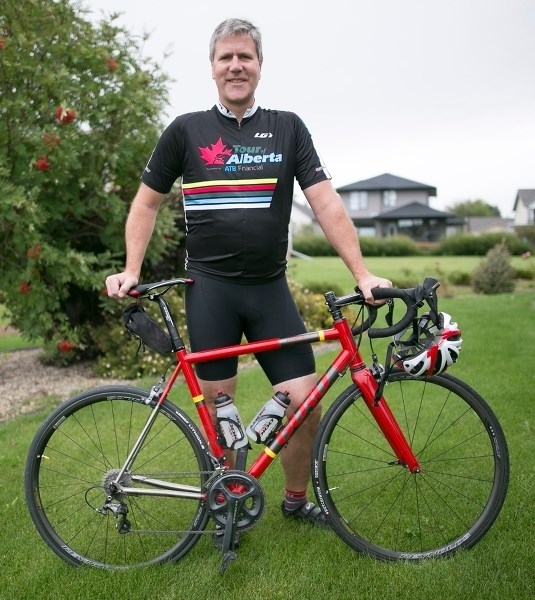Like so many others, his athletic career started on the ice.
Peter Verhesen grew up in Trochu and from 1984-85, played for the Olds Grizzlys. For him, the bike was a means to an end, to train for hockey.
He continued to compete at the rink while studying at the University of Alberta, but as a speedskater. That's when one of his teammates encouraged him to give cycling a try.
In two years, he made the national team in 1988. Evidently, skating and cycling complemented each other well.
"There are so many hockey players that would be incredible in different sports. They just don't get a chance to do them," Verhesen says.
Today, the 49-year-old lives in Olds, commuting to Calgary to run his autobody shop. As vice-chair of the Alberta Peloton Association, the non-profit organization that organizes the Tour of Alberta, Verhesen is still involved with the cycling world after a short, but storied career between 1987 and 1992.
Verhesen did his cycling with a pro-am team sponsored by Toshiba-Husky. It paid; just not as much as it would have if he were a full professional. Compare it to minor-pro hockey versus the NHL, he says.
He biked in the Tour de Trump, a race sponsored by Donald Trump in the 1980s and early 90s that was later renamed the Tour Dupont. He also rode in the Peace Race, considered to be Eastern Europe's version of the Tour de France.
Verhesen won a silver medal with Team Canada at the 1990 Commonwealth Games in New Zealand in men's team trial. He raced twice at the World Championships in men's team time trial, in 1989 and 1991. His teams finished 17th and 19th respectively.
At the 1991 Tour de Bretagne Cycliste in Brittany, France, he finished third.
Looking back, his favourite thing about cycling was the "camaraderie" with his teammates. He loved travelling and he loved meeting people from all over the world.
But it was also time-consuming. So in 1992, before the Barcelona Olympics, he retired. Verhesen says he had an offer to join a professional French team at the time, but he would have needed to spend six months away in a year – a lot to ask his new wife to put up with.
These days, Verhesen still finds time to spend with his bike, a titanium GURU. But he doesn't ride more than 100 kilometres per week. If that sounds like a lot, he says amateur riders can put up to 25,000 km on their bikes in a year. Professionals, up to 45,000 km.
"I think it's one of the hardest sports there is," he says.
Like other sports, the technology in cycling has evolved. He remembers pedalling with straps around his feet instead of today's clipless pedals that keep your shoes locked in. Back then, riders wore leather skullcaps instead of modern bike helmets.
Clothing, and most importantly, the bikes themselves are lighter than they've ever been. Everything, from the wheels, bars and frames are designed for optimal aerodynamic performance. As opposed to steel, carbon fibre is light, strong and easy to mould in order to meet elite cycling's demands.
During sprint intervals, Verhesen says riders coming into Olds can reach a peak speed of 70 km/h, depending on wind.
There will be several big names to watch this Friday, including Dutch rider Bauke Mollema, the defending Tour of Alberta champion who finished 11th at this year's Tour de France. Also, one of Canada's top cyclists, Ryder Hesjedal, who competed at the 2012 London Olympics, will be riding as well. It will be one of the last chances to see him race, as the 35-year-old is retiring after this year.
Verhesen says he is hoping for a good turnout when the cyclists arrive in town between 3 and 5 p.m. and afterward during the festival.
Another goal is to raise the profile of cycling in the community, to create a stronger bike culture, because the sport is near-universal – it's for everybody. Almost everybody has ridden a bike in their lives. It's a great non-impact exercise for aging people, he says, like his 87-year-old father.
The local area is also a prime cycling spot, he says: with good roads, nice scenery and weather that's as good as you can hope for in Canada.
Verhesen's advice is simple and can be applied by those wanting to get faster or just getting started, "Just ride, and ride hard."
"I think it's one of the hardest sports there is." PETER VERHESEN



